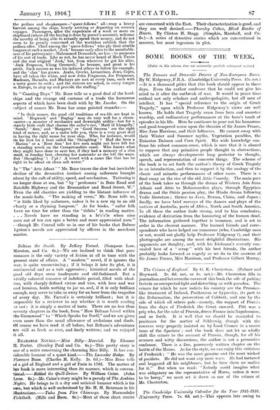The Crimes of England. By G. K. Chesterton. (Palmer and
Hayward. 2s. 6d. net, or is. net.)—Mr. Chesterton fills in journalism and between the covers of this book the role of putting facts in an unexpected light and disturbing us with paradox. The crimes for which he now indicts his country are the Prussian- like treatment of Ireland, Puritanism or hypocrisy, its part in the Reformation, the persecution of Cobbett, and one by the side of which all others pale—namely, the support of Prussia from the days of Frederick the Great onward. Pitt was a prig who, for the sake of Prussia, drove France into Napoleonism, and so forth. It is well that we should be reminded to penitence for the matter of Schleswig, though with the reserves very properly insisted on by Lord Cromer in a recent issue of the Spectator; and the book does not let us wholly shift the crimes to the account of Prussia, though, for all his acumen and witty discursions, the author is not a persuasive confessor. There is a fine, generously written chapter on the battle of the Marne. As for the style, we can enjoy this criticism of Frederick : "He was the most genuine and the most wicked of pacifists. He did not want any more wars. Ho had tortured and beggared all his neighbours, but he bore them no malice for it." But when we read: "Nobody could imagine what was obligatory on the representative of Horse, unless it were to be horsy," we must set it down as one of the crimes of Mr. Chesterton,


































 Previous page
Previous page